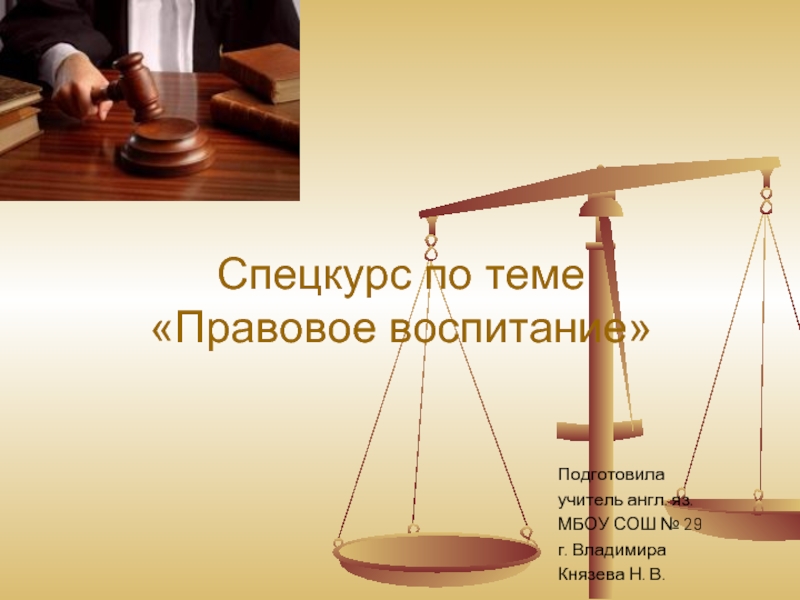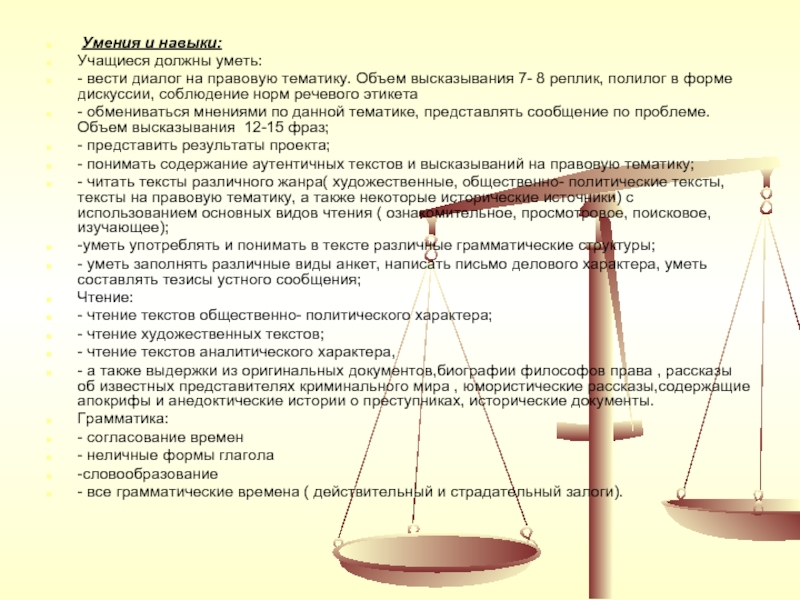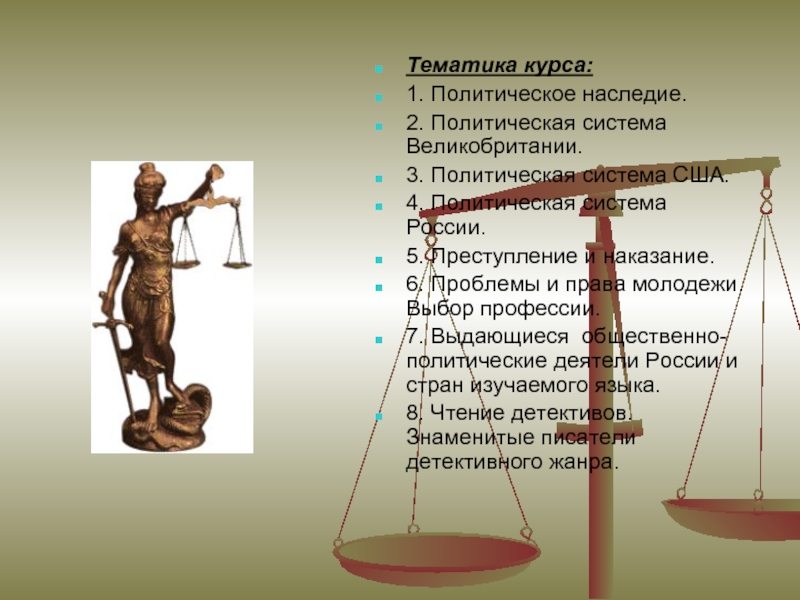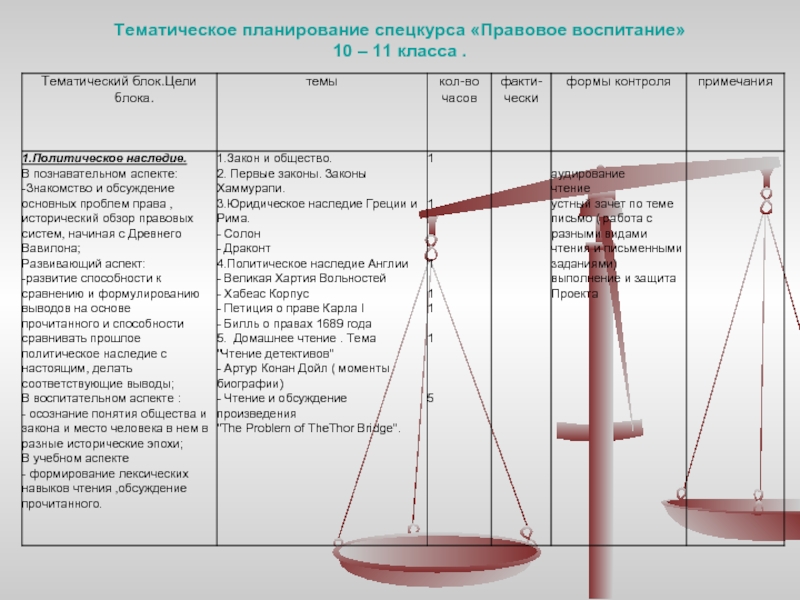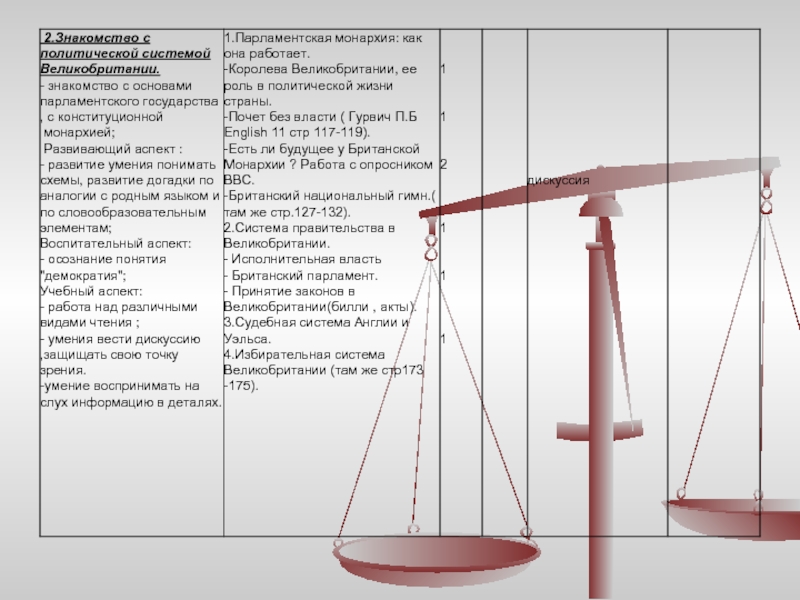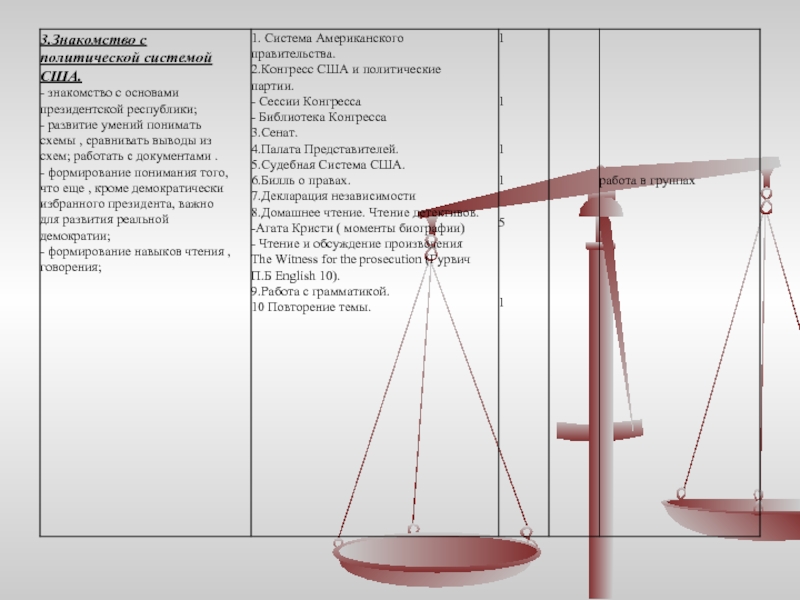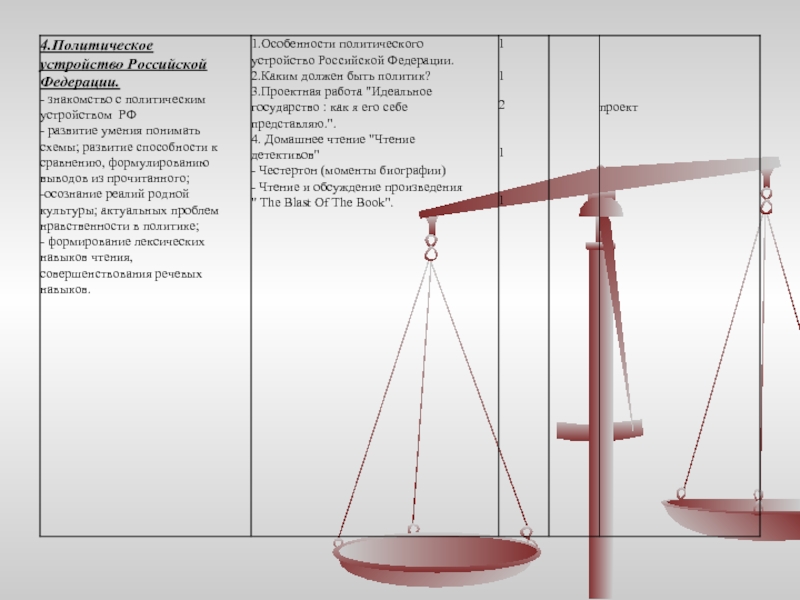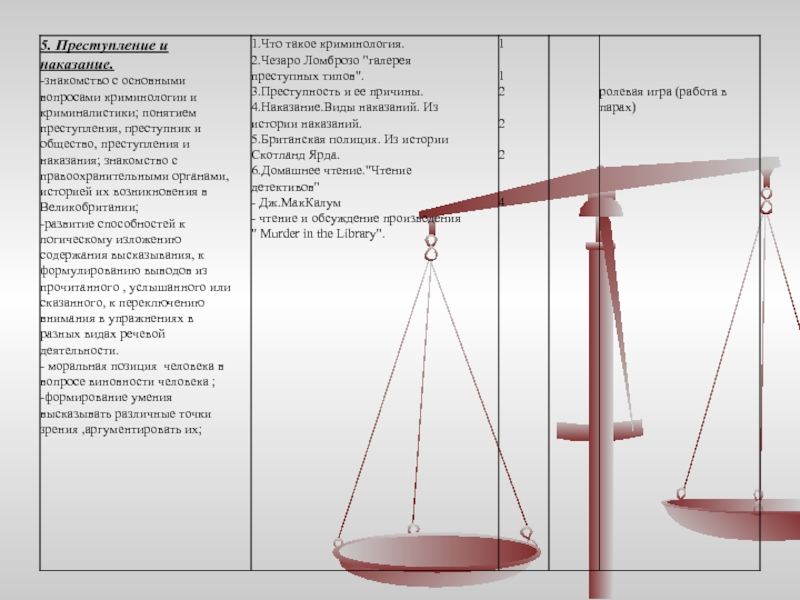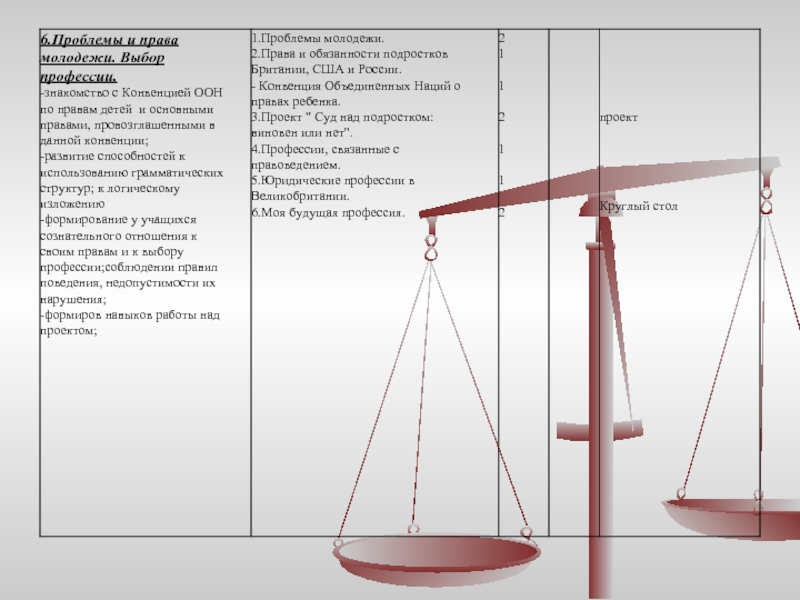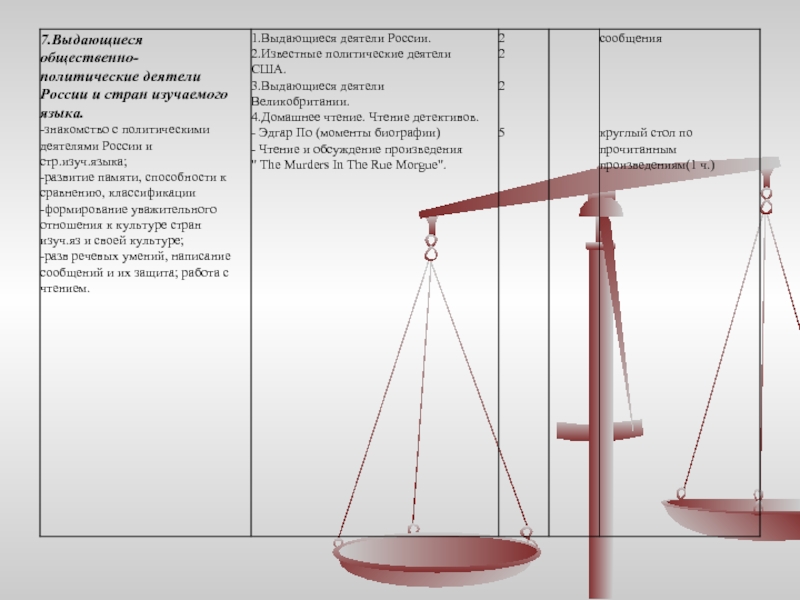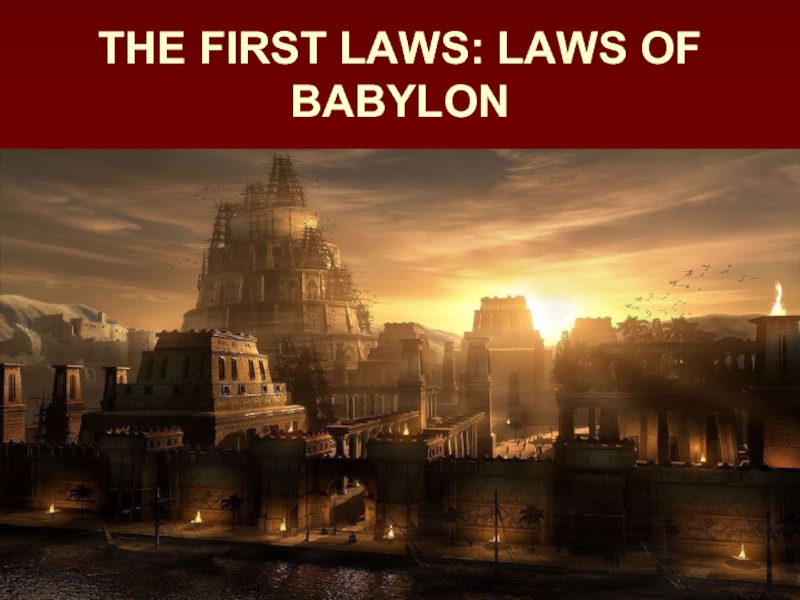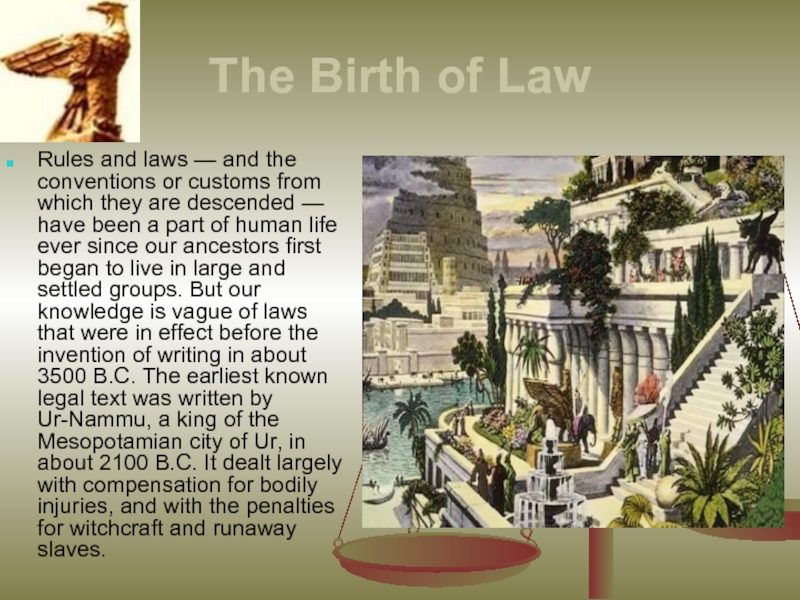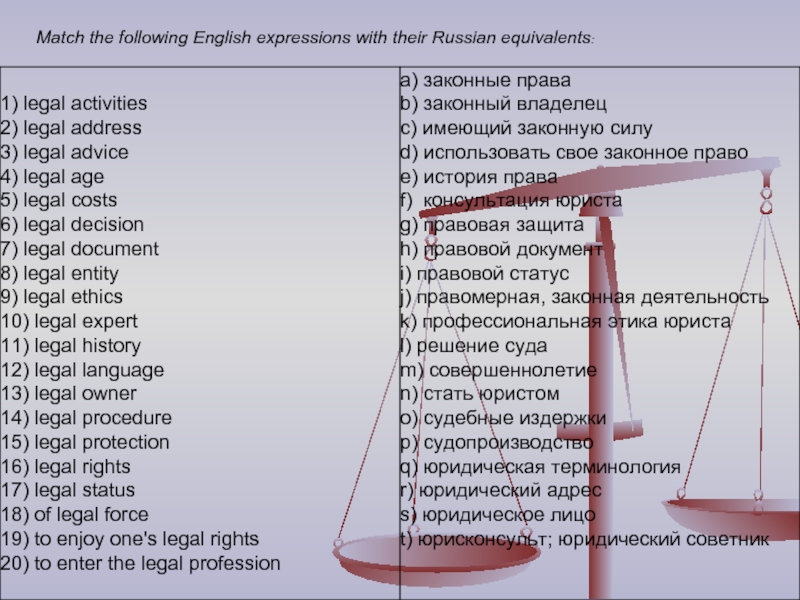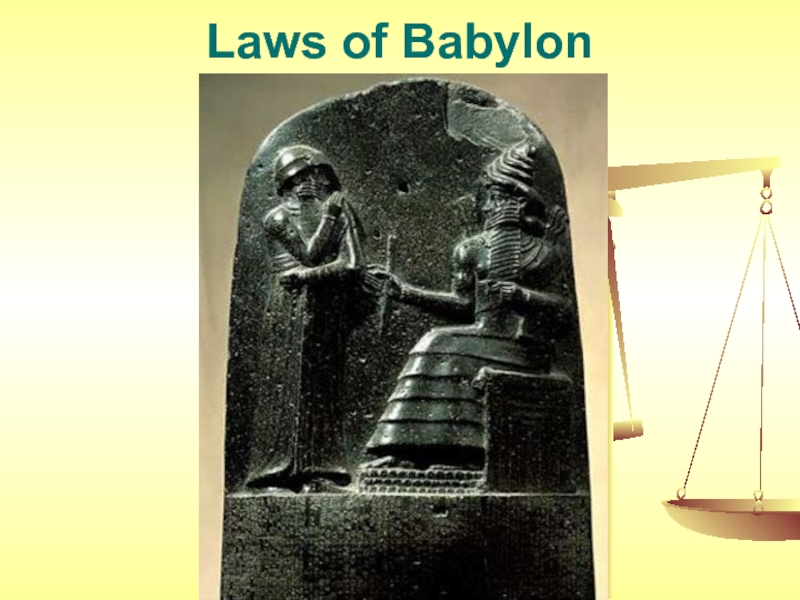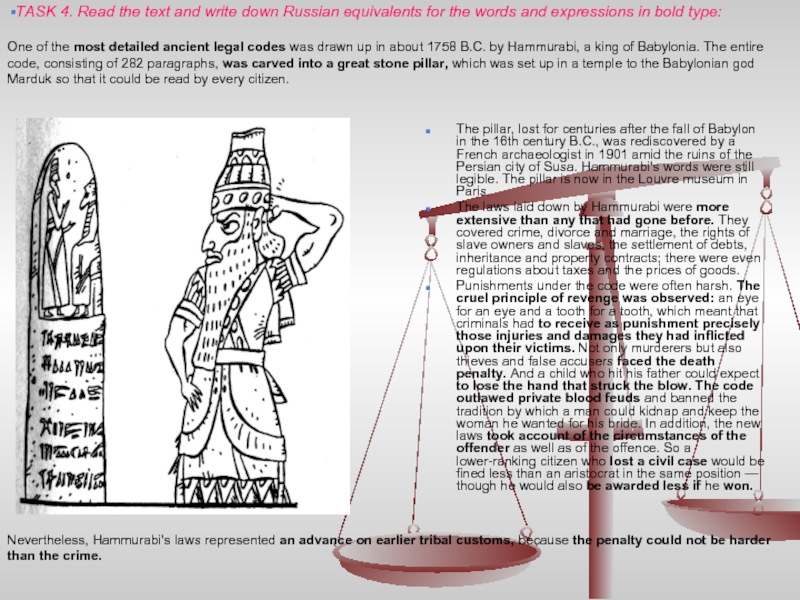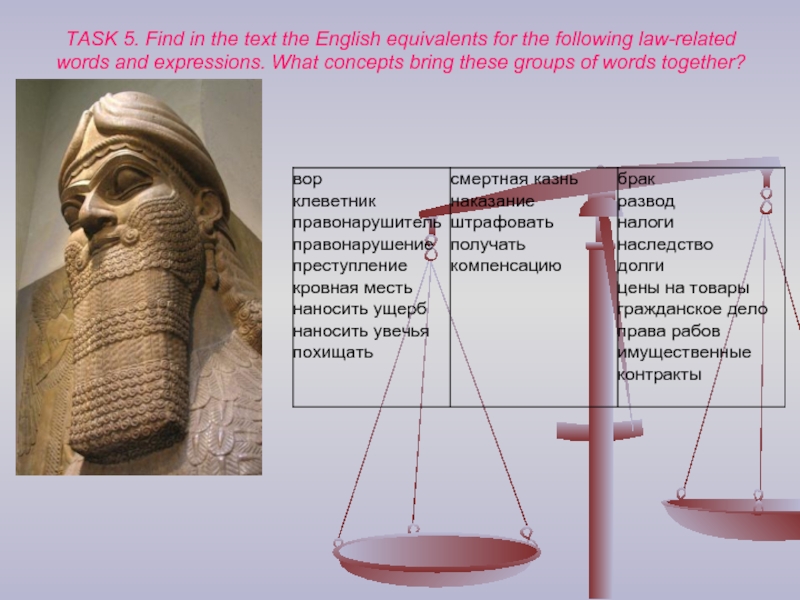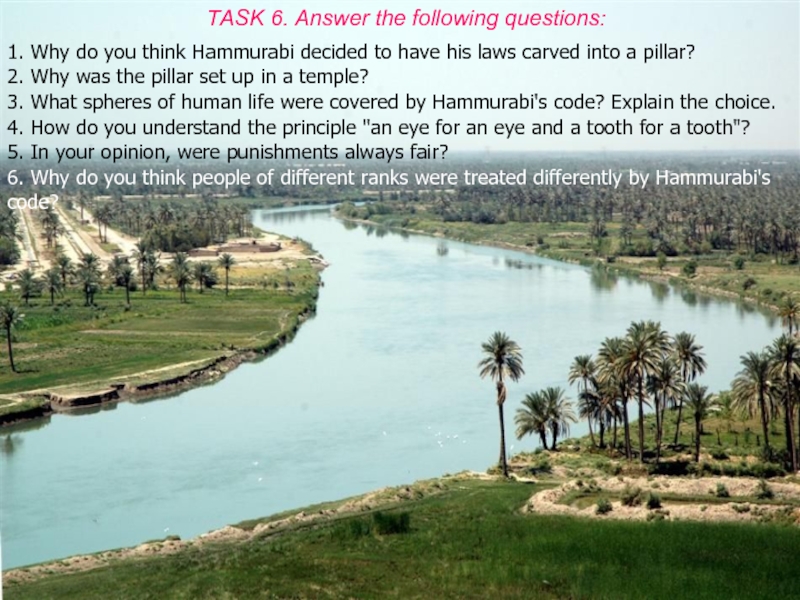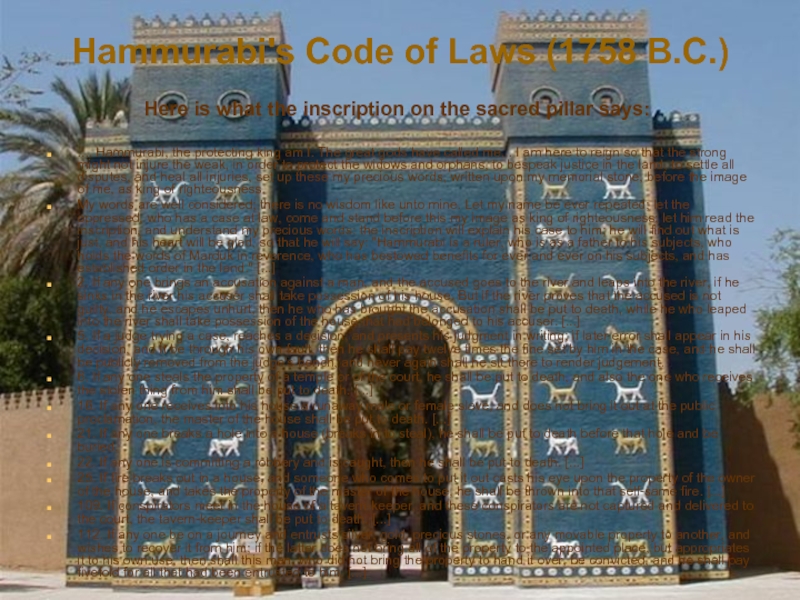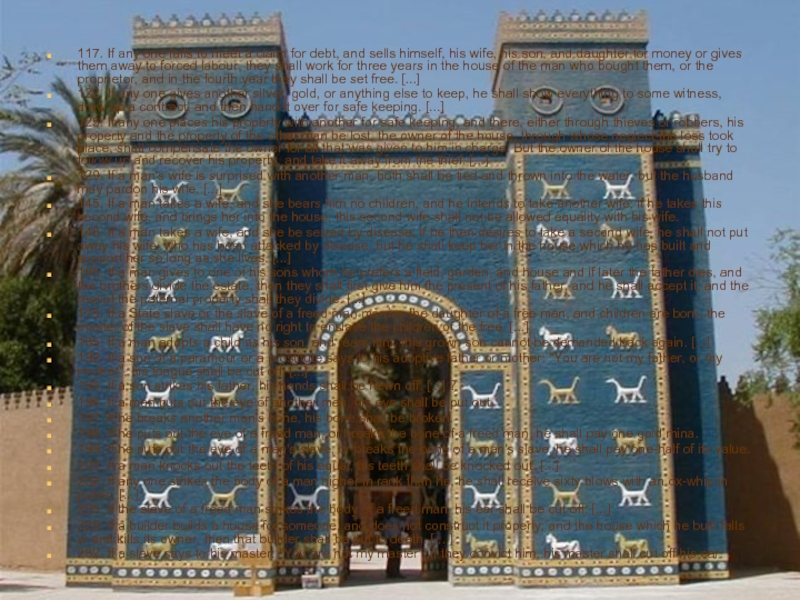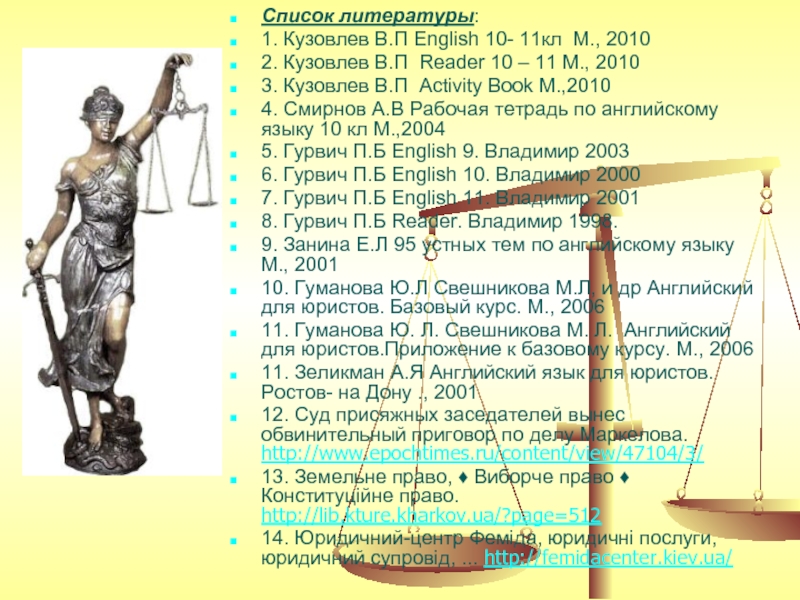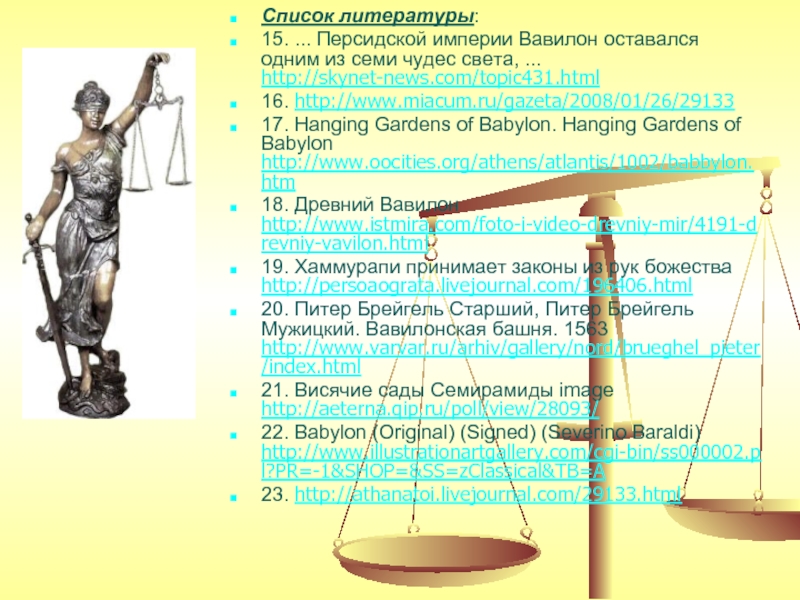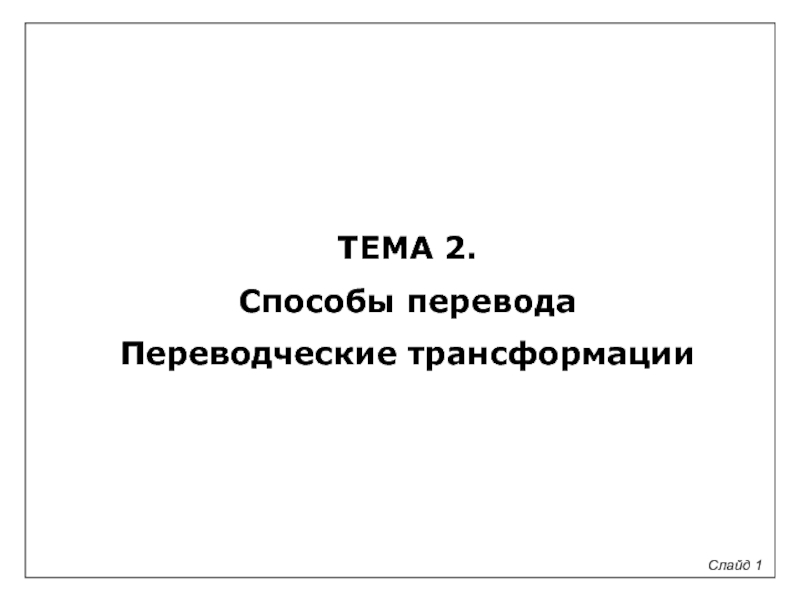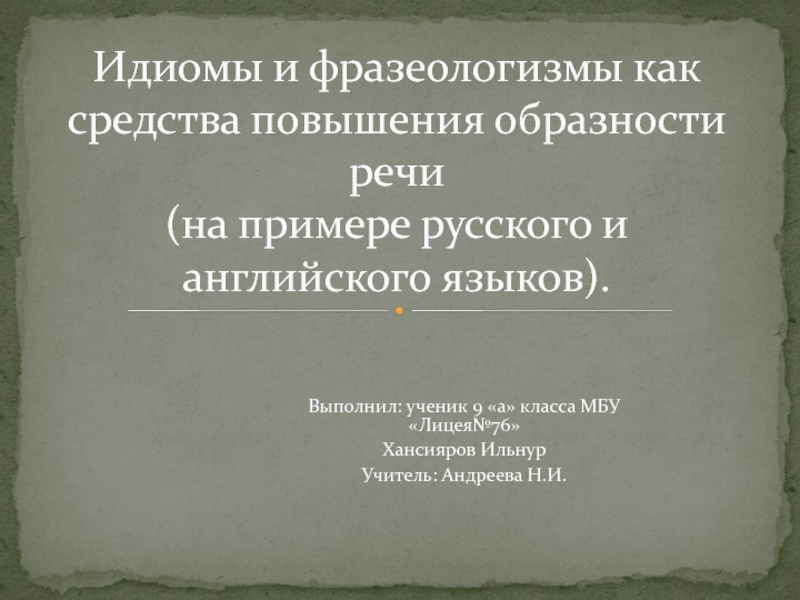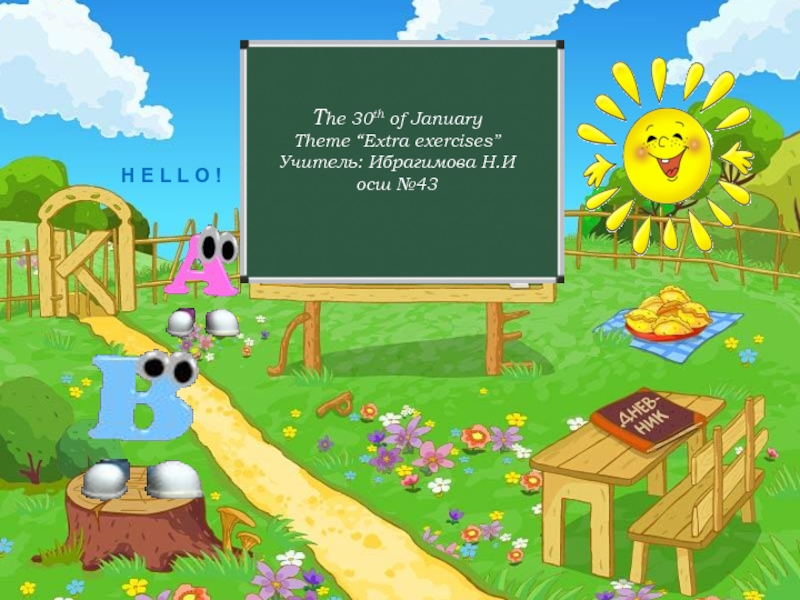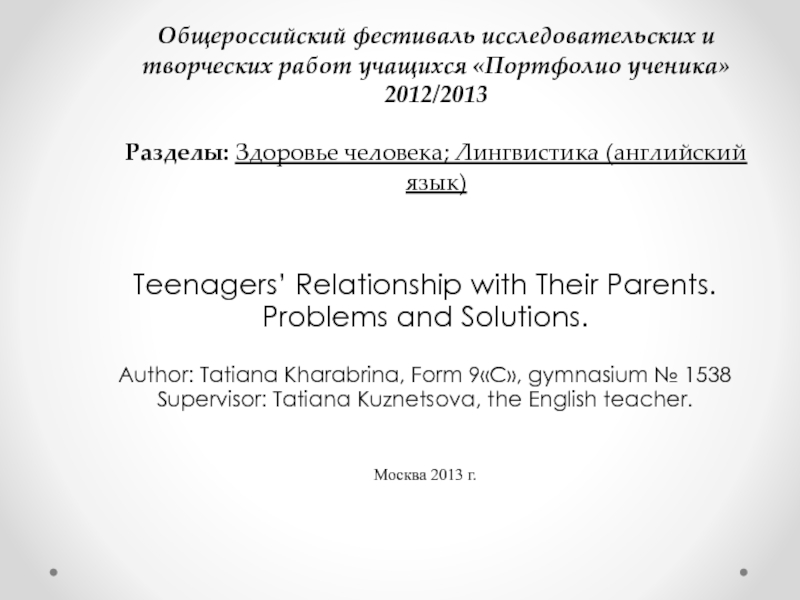Разделы презентаций
- Разное
- Английский язык
- Астрономия
- Алгебра
- Биология
- География
- Геометрия
- Детские презентации
- Информатика
- История
- Литература
- Математика
- Медицина
- Менеджмент
- Музыка
- МХК
- Немецкий язык
- ОБЖ
- Обществознание
- Окружающий мир
- Педагогика
- Русский язык
- Технология
- Физика
- Философия
- Химия
- Шаблоны, картинки для презентаций
- Экология
- Экономика
- Юриспруденция
Правовое воспитание
Содержание
- 1. Правовое воспитание
- 2. В настоящее время в соответствии с распоряжением
- 3. Цель: Формирование у учащихся коммуникативной компетенции и
- 4. Умения и навыки:Учащиеся должны уметь:- вести
- 5. Тематика курса:1. Политическое наследие.2. Политическая система Великобритании.3.
- 6. Тематическое планирование спецкурса «Правовое воспитание» 10 – 11 класса .
- 7. Слайд 7
- 8. Слайд 8
- 9. Слайд 9
- 10. Слайд 10
- 11. Слайд 11
- 12. Слайд 12
- 13. Фрагмент урока по теме «Первые законы. Законы Хаммурапи»
- 14. THE FIRST LAWS: LAWS OF BABYLON
- 15. The Birth of LawRules and laws —
- 16. TASK 1. Find in the text the
- 17. Match the following English expressions with their Russian equivalents:
- 18. BRAINSTORM Work in groups. What associations does
- 19. Слайд 19
- 20. Laws of Babylon
- 21. TASK 4. Read the text and write
- 22. TASK 5. Find in the text the
- 23. TASK 6. Answer the following questions:1. Why
- 24. TASK 7. Translate the following passage into
- 25. Слайд 25
- 26. Hammurabi's Code of Laws (1758 B.C.).... Hammurabi,
- 27. 117. If any one fails to meet
- 28. Слайд 28
- 29. Список литературы:1. Кузовлев В.П English 10- 11кл
- 30. Список литературы:15. ... Персидской империи Вавилон оставался
- 31. Скачать презентанцию
Слайды и текст этой презентации
Слайд 1Спецкурс по теме
«Правовое воспитание»
Подготовила
учитель англ. яз.
МБОУ СОШ № 29
г. Владимира
Князева
Н. В.
Слайд 2В настоящее время в соответствии с распоряжением правительства РФ об
одобрении "Концепции модернизации российского образования на период до 2010 года"
на старшей ступени общего образования создается система профильного обучения, ориентированная на специализированную подготовку учащихся. Профильное обучение в средней школе направлено на обеспечение дифференциации и индивидуализации учебного процесса за счет изменения в его структуре, содержании и организации, позволяющих более полно учитывать интересы, склонности, способности учащихся, создавать условия для обучения старшеклассников в соответствии с их профессиональными интересами и намерениями в отношении продолжения образования.Обучение иностранному языку с учетом реализации целей профильного обучения предполагает обновление содержания языкового образования с учетом личностно- ориентированного подхода, усиление коммуникативной направленности языкового образования, обеспечение дифференцированного подхода и индивидуализации в обучении, внедрении современных педагогических технологий.
Одним из путей дифференцированного подхода к обучению в нашей школе было создание на старшей ступени профильного класса ( группы) по изучению основ правоведения. Цель предоставить возможность пополнить знания учащихся в области правоведения, познакомить с особенностью правовой системы.
В правовой группе 10-11 классов английский язык изучается 3 раза в неделю. Так как часть учащихся после окончания общеобразовательной школы выбирают профессии, связанные с правоведением им необходимы знания правового и социокультурного характера по иностранному языку. С этой целью был разработан курс "Правовое воспитание ", который изучается 1 час в неделю – 34 часа в 10 кл, 34 ч- в 11 кл.
Слайд 3Цель: Формирование у учащихся коммуникативной компетенции и знаний правового и
социокультурного характера, позволяющих использовать иностранный язык в целях дальнейшего получения
образования.Задачи:
- обогатить учащихся знаниями о правовой культуре нашей страны и стран изучаемого языка;
- совершенствовать навыки и умения устной речи в пределах изучаемой тематики для повседневного общения;
-совершенствовать навыки чтения и понимания литературы по правовой тематике с целью извлечения полезной информации; развивать навыки работы с историческими источниками;
- расширение кругозора , общей эрудиции учащихся;
- развитие познавательных интересов в области права, навыков проектно- исследовательской работы;
- развитие творческой активности, умение работать в сотрудничестве;
- воспитание гражданской ответственности, правового самосознания, духовности и культуры, способности к социализации в обществе;
- воспитание сознательного отношения к выбору профессии;
- повышение мотивации изучения иностранного языка в контексте будущей профессии.
Слайд 4 Умения и навыки:
Учащиеся должны уметь:
- вести диалог на правовую
тематику. Объем высказывания 7- 8 реплик, полилог в форме дискуссии,
соблюдение норм речевого этикета- обмениваться мнениями по данной тематике, представлять сообщение по проблеме. Объем высказывания 12-15 фраз;
- представить результаты проекта;
- понимать содержание аутентичных текстов и высказываний на правовую тематику;
- читать тексты различного жанра( художественные, общественно- политические тексты, тексты на правовую тематику, а также некоторые исторические источники) с использованием основных видов чтения ( ознакомительное, просмотровое, поисковое, изучающее);
-уметь употреблять и понимать в тексте различные грамматические структуры;
- уметь заполнять различные виды анкет, написать письмо делового характера, уметь составлять тезисы устного сообщения;
Чтение:
- чтение текстов общественно- политического характера;
- чтение художественных текстов;
- чтение текстов аналитического характера,
- а также выдержки из оригинальных документов,биографии философов права , рассказы об известных представителях криминального мира , юмористические рассказы,содержащие апокрифы и анедоктические истории о преступниках, исторические документы.
Грамматика:
- согласование времен
- неличные формы глагола
-словообразование
- все грамматические времена ( действительный и страдательный залоги).
Слайд 5Тематика курса:
1. Политическое наследие.
2. Политическая система Великобритании.
3. Политическая система США.
4.
Политическая система России.
5. Преступление и наказание.
6. Проблемы и права молодежи.
Выбор профессии.7. Выдающиеся общественно- политические деятели России и стран изучаемого языка.
8. Чтение детективов. Знаменитые писатели детективного жанра.
Слайд 15The Birth of Law
Rules and laws — and the conventions
or customs from which they are descended — have been
a part of human life ever since our ancestors first began to live in large and settled groups. But our knowledge is vague of laws that were in effect before the invention of writing in about 3500 B.C. The earliest known legal text was written by Ur-Nammu, a king of the Mesopotamian city of Ur, in about 2100 B.C. It dealt largely with compensation for bodily injuries, and with the penalties for witchcraft and runaway slaves.Слайд 16TASK 1. Find in the text the words that mean
the following:
the use of magic power, especially with the aid
of evil spiritsa punishment imposed for a violation of law or rule
an accepted social custom or practice
payment for damage or loss, restitution
one from whom a person is descended
harm or damage done or suffered
TASK 2. Answer the following questions:
1. Why is it difficult to judge about the earliest laws?
2. Where and why did the first laws appear?
3. What issues did the early laws emphasise? Why?
TASK 3. The word LEGAL has the following meanings in Russian:
1) юридический
legal person — юридическое лицо
2) правовой
legal text — правовой текст
3) судебный
legal action — судебный иск
4) законный, дозволенный законом
legal owner — законный владелец
5) легальный
legal activities — правомерная, законная деятельность
Слайд 18BRAINSTORM Work in groups. What associations does the word 'Babylon' call
to mind? Make a list of ideas and compare your
notes.Слайд 21TASK 4. Read the text and write down Russian equivalents
for the words and expressions in bold type:
The pillar, lost
for centuries after the fall of Babylon in the 16th century B.C., was rediscovered by a French archaeologist in 1901 amid the ruins of the Persian city of Susa. Hammurabi's words were still legible. The pillar is now in the Louvre museum in Paris.The laws laid down by Hammurabi were more extensive than any that had gone before. They covered crime, divorce and marriage, the rights of slave owners and slaves, the settlement of debts, inheritance and property contracts; there were even regulations about taxes and the prices of goods.
Punishments under the code were often harsh. The cruel principle of revenge was observed: an eye for an eye and a tooth for a tooth, which meant that criminals had to receive as punishment precisely those injuries and damages they had inflicted upon their victims. Not only murderers but also thieves and false accusers faced the death penalty. And a child who hit his father could expect to lose the hand that struck the blow. The code outlawed private blood feuds and banned the tradition by which a man could kidnap and keep the woman he wanted for his bride. In addition, the new laws took account of the circumstances of the offender as well as of the offence. So a lower-ranking citizen who lost a civil case would be fined less than an aristocrat in the same position — though he would also be awarded less if he won.
Nevertheless, Hammurabi's laws represented an advance on earlier tribal customs, because the penalty could not be harder than the crime.
One of the most detailed ancient legal codes was drawn up in about 1758 B.C. by Hammurabi, a king of Babylonia. The entire
code, consisting of 282 paragraphs, was carved into a great stone pillar, which was set up in a temple to the Babylonian god
Marduk so that it could be read by every citizen.
Слайд 22TASK 5. Find in the text the English equivalents for
the following law-related words and expressions. What concepts bring these
groups of words together?Слайд 23TASK 6. Answer the following questions:
1. Why do you think
Hammurabi decided to have his laws carved into a pillar?
2.
Why was the pillar set up in a temple?3. What spheres of human life were covered by Hammurabi's code? Explain the choice.
4. How do you understand the principle "an eye for an eye and a tooth for a tooth"?
5. In your opinion, were punishments always fair?
6. Why do you think people of different ranks were treated differently by Hammurabi's
code?
Слайд 24TASK 7. Translate the following passage into English paying special
attention to the words and expressions in bold type:
В 1901
году французские археологи обнаружили каменный столб среди руин персидского города Сузы. Текст, высеченный на столбе, был древнейшим сводом законов. Он был составлен Хаммурапи, царем Вавилона, в XVIII столетии до н. э.Кодекс Хаммурапи состоит из 282 статей. Установленный в храме вавилонского бога Мардука, "столб законов" должен был служить правосудию и одновременно напоминать: законы должны знать все.
Кодекс охватывал все сферы жизни. Он ставил вне закона кровную месть, убийство, похищение невесты. Наказания за них были суровы.
В основе Кодекса лежит идея талиона: наказание должно быть "равным" преступлению — "око за око, зуб за зуб". В соответствии с кодексом, если человек, обвинивший другого в краже, не мог привести свидетелей, подтверждающих его слова, ему грозила смерть как клеветнику.
Кодекс также охватывал вопросы имущества и наследства. Хаммурапи устанавливал денежный штраф, при назначении которого учитывалось как само правонарушение, так и социальное положение граждан.
Кодекс Хаммурапи
Слайд 26Hammurabi's Code of Laws (1758 B.C.)
.... Hammurabi, the protecting king
am I. The great gods have called me... I am
here to reign so that the strong might not injure the weak, in order to protect the widows and orphans, to bespeak justice in the land, to settle all disputes, and heal all injuries, set up these my precious words, written upon my memorial stone, before the image of me, as king of righteousness.My words are well considered; there is no wisdom like unto mine. Let my name be ever repeated; let the oppressed, who has a case at law, come and stand before this my image as king of righteousness; let him read the inscription, and understand my precious words: the inscription will explain his case to him; he will find out what is just, and his heart will be glad, so that he will say: "Hammurabi is a ruler, who is as a father to his subjects, who holds the words of Marduk in reverence, who has bestowed benefits for ever and ever on his subjects, and has established order in the land." [...]
2. If any one brings an accusation against a man, and the accused goes to the river and leaps into the river, if he sinks in the river his accuser shall take possession of his house. But if the river proves that the accused is not guilty, and he escapes unhurt, then he who has brought the accusation shall be put to death, while he who leaped into the river shall take possession of the house that had belonged to his accuser. [...]
5. If a judge trying a case, reaches a decision, and presents his judgment in writing; if later error shall appear in his decision, and it be through his own fault, then he shall pay twelve times the fine set by him in the case, and he shall be publicly removed from the judge's bench, and never again shall he sit there to render judgement.
6. If any one steals the property of a temple or of the court, he shall be put to death, and also the one who receives the stolen thing from him shall be put to death. [...]
16. If any one receives into his house a runaway male or female slave, and does not bring it out at the public proclamation, the master of the house shall be put to death. [...]
21. If any one breaks a hole into a house (breaks in to steal), he shall be put to death before that hole and be buried.
22. If any one is committing a robbery and is caught, then he shall be put to death. [...]
25. If fire breaks out in a house, and someone who comes to put it out casts his eye upon the property of the owner of the house, and takes the property of the master of the house, he shall be thrown into that self-same fire. [...]
109. If conspirators meet in the house of a tavern-keeper, and these conspirators are not captured and delivered to the court, the tavern-keeper shall be put to death. [...]
112. If any one be on a journey and entrusts silver, gold, precious stones, or any movable property to another, and wishes to recover it from him; if the latter does not bring all of the property to the appointed place, but appropriates it to his own use, then shall this man, who did not bring the property to hand it over, be convicted, and he shall pay fivefold for all that had been entrusted to him. [...]
Here is what the inscription on the sacred pillar says:
Слайд 27117. If any one fails to meet a claim for
debt, and sells himself, his wife, his son, and daughter
for money or gives them away to forced labour, they shall work for three years in the house of the man who bought them, or the proprietor, and in the fourth year they shall be set free. [...]122. If any one gives another silver, gold, or anything else to keep, he shall show everything to some witness, draw up a contract, and then hand it over for safe keeping. [...]
125. If any one places his property with another for safe keeping, and there, either through thieves or robbers, his property and the property of the other man be lost, the owner of the house, through whose neglect the loss took place, shall compensate the owner for all that was given to him in charge. But the owner of the house shall try to follow up and recover his property, and take it away from the thief. [...]
129. If a man's wife is surprised with another man, both shall be tied and thrown into the water, but the husband may pardon his wife. [...]
145. If a man takes a wife, and she bears him no children, and he intends to take another wife; if he takes this second wife, and brings her into the house, this second wife shall not be allowed equality with his wife.
148. If a man takes a wife, and she be seized by disease; if he then desires to take a second wife, he shall not put away his wife, who has been attacked by disease, but he shall keep her in the house which he has built and support her so long as she lives. [...]
165. If a man gives to one of his sons whom he prefers a field, garden, and house and if later the father dies, and the brothers divide the estate, then they shall first give him the present of his father, and he shall accept it; and the rest of the paternal property shall they divide. [...]
175. If a State slave or the slave of a freed man marries the daughter of a free man, and children are born, the master of the slave shall have no right to enslave the children of the free. [...]
185. If a man adopts a child as his son, and rears him, this grown son cannot be demanded back again. [...]
192. If a son of a paramour or a prostitute says to his adoptive father or mother: "You are not my father, or my mother", his tongue shall be cut off. [...]
195. If a son strikes his father, his hands shall be hewn off. [...] ?
196. If a man puts out the eye of another man, his eye shall be put out.
197. If he breaks another man's bone, his bone shall be broken.
198. If he puts out the eye of a freed man, or breaks the bone of a freed man, he shall pay one gold mina.
199. If he puts out the eye of a man's slave, or breaks the bone of a man's slave, he shall pay one-half of its value.
200. If a man knocks out the teeth of his equal, his teeth shall be knocked out. [...]
202. If any one strikes the body of a man higher in rank than he, he shall receive sixty blows with an ox-whip in public. [...]
205. If the slave of a freed man strikes the body of a freed man, his ear shall be cut off. [...]
229. If a builder builds a house for someone, and does not construct it properly; and the house which he built falls in and kills its owner, then that builder shall be put to death. [... ]
282. If a slave says to his master: "You are not my master"; if they convict him, his master shall cut off his ear.
Слайд 29Список литературы:
1. Кузовлев В.П English 10- 11кл М., 2010
2. Кузовлев
В.П Reader 10 – 11 М., 2010
3. Кузовлев В.П Activity
Book М.,20104. Смирнов А.В Рабочая тетрадь по английскому языку 10 кл М.,2004
5. Гурвич П.Б English 9. Владимир 2003
6. Гурвич П.Б English 10. Владимир 2000
7. Гурвич П.Б English 11. Владимир 2001
8. Гурвич П.Б Reader. Владимир 1998.
9. Занина Е.Л 95 устных тем по английскому языку М., 2001
10. Гуманова Ю.Л Свешникова М.Л, и др Английский для юристов. Базовый курс. М., 2006
11. Гуманова Ю. Л. Свешникова М. Л. Английский для юристов.Приложение к базовому курсу. М., 2006
11. Зеликман А.Я Английский язык для юристов. Ростов- на Дону ., 2001
12. Суд присяжных заседателей вынес обвинительный приговор по делу Маркелова. http://www.epochtimes.ru/content/view/47104/3/
13. Земельне право, ♦ Виборче право ♦ Конституційне право. http://lib.kture.kharkov.ua/?page=512
14. Юридичний-центр Феміда, юридичні послуги, юридичний супровід, ... http://femidacenter.kiev.ua/
Слайд 30Список литературы:
15. ... Персидской империи Вавилон оставался одним из семи
чудес света, ... http://skynet-news.com/topic431.html
16. http://www.miacum.ru/gazeta/2008/01/26/29133
17. Hanging Gardens of Babylon. Hanging
Gardens of Babylon http://www.oocities.org/athens/atlantis/1002/babbylon.htm18. Древний Вавилон http://www.istmira.com/foto-i-video-drevniy-mir/4191-drevniy-vavilon.html
19. Хаммурапи принимает законы из рук божества http://persoaograta.livejournal.com/196406.html
20. Питер Брейгель Старший, Питер Брейгель Мужицкий. Вавилонская башня. 1563 http://www.varvar.ru/arhiv/gallery/nord/brueghel_pieter/index.html
21. Висячие сады Семирамиды image http://aeterna.qip.ru/poll/view/28093/
22. Babylon (Original) (Signed) (Severino Baraldi) http://www.illustrationartgallery.com/cgi-bin/ss000002.pl?PR=-1&SHOP=&SS=zClassical&TB=A
23. http://athanatoi.livejournal.com/29133.html
